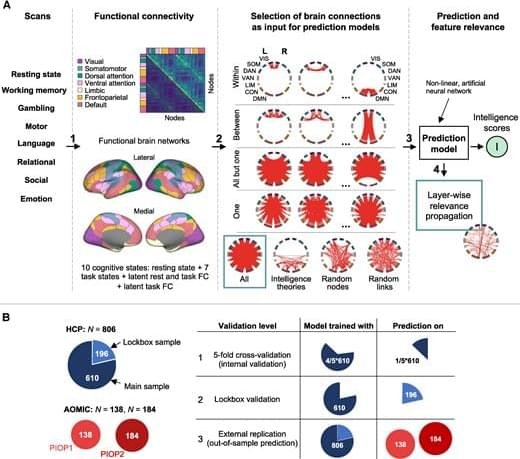Neuroscientific research on human behavior and cognition has methodologically moved from unimodal explanatory approaches to machine learning-based predictive modeling (1). This implies a shift from standard approaches testing for associations between behavior and single neurobiological variables within one sample (unimodal explanatory research) to the identification of relationships between behavior and multiple neurobiological variables to forecast behavior of unseen individuals across samples (multimodal predictive research) (2). Modern machine learning techniques can learn such general relations in neural data (2, 3) and have consequently become increasingly prominent also in research on fundamental psychological constructs like intelligence (4).
Intelligence captures the general cognitive ability level of an individual person and predicts crucial life outcomes, such as academic achievement, health, and longevity (5, 6). Multiple psychometrical theories about the underlying conceptual structure of intelligence have been proposed. For example, Spearman (7) noticed that a person’s performance on different cognitive tasks is positively correlated and suggested that this “positive manifold” results from an underlying common factor—general intelligence (g). A decomposition of the g-factor into fluid (gF) and crystallized (gC) components was later proposed by Cattell (8, 9). While fluid intelligence is assumed to mainly consist of inductive and deductive reasoning abilities that are rather independent of prior knowledge and cultural influences, crystallized intelligence reflects the ability to apply acquired knowledge and thus depends on experience and culture (10).
Neurobiological correlates of intelligence differences were identified in brain structure (11) and brain function (12). However, rather than disclose a single “intelligence brain region”, meta-analyses and systematic reviews suggest the involvement of a distributed brain network (13–15), thus paving the way for proposals of whole-brain structural and functional connectivity (FC) underlying intelligence (16, 17). While the great majority of such studies used an explanatory approach, recently, an increasing number of machine learning-based techniques were developed and applied to predict intelligence from brain features (4, 18, 19). Although intrinsic FC measured during the (task-free) resting state has enabled robust prediction of intelligence (19), prediction performance can be boosted by measuring connectivity during task performance (18, 20).




